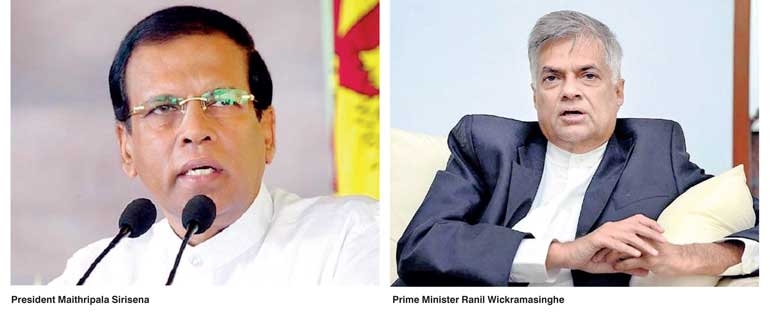Monday Feb 16, 2026
Monday Feb 16, 2026
Thursday, 22 February 2018 00:00 - - {{hitsCtrl.values.hits}}

Following the large gains made at the local government elections at the expense of the UNP and SLFP by the Mahinda Rajapaksa-led SLPP, the pro-Mahinda Rajapaksa Opposition has been calling for the resignation of the Prime Minister on the basis of the spurious claim that the Government has lost its mandate to govern.
Rajan Philips (‘The Government’s consummate crisis in the face of Mahinda’s unconsummatable win’, The Island 17 February, 2018) has stated quite rightly that SLPP’s success at the local elections “cannot directly enable Mahinda Rajapaksa to replace the Government at the national level.” As Rajan Philips has pointed out, “how would the local government election results ever justify Nimal Siripala de Silva worming his way to Temple Trees as Prime Minister of a minority government?”
The local government elections were not intended to provide a mandate to govern at the centre but that has not prevented the Opposition parties baying for the Prime Minister’s blood demanding that the President sack him.
This is a crisis that has been manufactured to unsettle the Government of which the President himself is a partner. The President seems not to know his own powers in this regard and sought the Attorney General’s advice but the latter has informed him that he, the Attorney General, alone cannot give an opinion on the matter and advised the President to consult the Supreme Court.
The President does not possess the power under the Constitution as amended to remove the Prime Minister. There is also no room for the application of the principle that he who hires may fire.
Prior to the 19th Amendment, the Constitution provided for the removal of the Prime Minister from office by the President as one of the several ways in which the Prime Minister’s term could have been brought to an end. Article 47 of the Constitution, in its pre-Nineteenth Amendment form, provided that “the Prime Minister shall continue to hold office throughout the period during which the Cabinet of Ministers continues to function under the provisions of the Constitution unless he - (a) is removed by a writing under the hand of the President; (b) resigns his office by a writing under his hand addressed to the President; or (c) ceases to be a Member of Parliament.”
The 19th Amendment repealed this provision and replaced it with a new provision, albeit replicating the language of Article 47 but without clause (a). It is provided – now in Article 46 (2) – that the Prime Minister shall continue to hold office unless he (a) resigns his office by a writing under his hand addressed to the President; or (b) ceases to be a Member of Parliament.
Unfortunately, despite the 19th Amendment taking away the President’s power to remove the Prime Minister, those responsible for its drafting made a mess of it in failing to make the necessary consequential amendments. Thus, Articles 47(2) and (3) continue to make references to the Prime Minister’s “… removal from office…”These words have now become a dead letter and ought to have been removed.
Article 48(1), which states that the Cabinet of Ministers shall stand dissolved on the Prime Minister “ceasing to hold office by death, resignation or otherwise…” seemingly confuses the issue. A quick glance at Article 66 would show that one of the ways in which a person would cease to be a member of Parliament is upon his death. There are many other instances when a person may cease to be a member; hence the phrase “or otherwise”.
Professor G.L. Peiris has echoed the view expressed by ex-Chief Justice Sarath Silva that there seemed to be neither a government nor a cabinet right now and the President could remove the Prime Minister, if required. Sarath Silva (“Cabinet illegal, Prez has power to appoint PM: Sarath”, Daily Mirror 16.2.2018) has contended “that the entire Cabinet including the Prime Minister stood illegal at the moment as the two-year period stipulated for the national unity Government had ceased.”
The President has no power to determine the legality of the Cabinet of Ministers of which he himself is a member. In any event, Parliament may determine only the number of Ministers in the Cabinet and not its formation, composition or duration.
Apart from the two instances referred to in Article 46 (2), the Prime Minister shall continue to hold office so long as the Cabinet of Ministers continues to function. The President may make changes to the subjects and functions to be assigned to ministers and the composition of the Cabinet but, as has been made clear by Article 43 (3), such changes “shall not affect the continuity of the Cabinet of Ministers…” Indeed, the Cabinet of Ministers will continue to function even after the dissolution of Parliament until the conclusion of the general election even though ministers may cease to be members of Parliament.
The changes brought about by the 19th Amendment are designed to free Parliament and the Prime Minister from subservience to the President. The President shall appoint as Prime Minister a member of Parliament who in the President’s opinion is most likely to command the confidence of Parliament. Once the Prime Minister has been appointed, the President may not interfere with his term. The Prime Minister is responsible to Parliament and not to the President. The Prime Minister may of course determine his own fate by resignation, or if he ceases to be a member of Parliament. By removing the President’s power to dismiss the Prime Minister, the 19th Amendment took away from the President his ability to destabilise the Government.
The Constitution in its original form made the term of the Parliament depend on the President’s will. Article 62 had provided that unless it was sooner dissolved, Parliament’s term was to be six years. The only qualification to this power of unilateral dissolution was that when a general election had been held consequent to upon the dissolution by the President, he shall not thereafter dissolve Parliament until the expiration of one year from the date of such election.
This power to dissolve Parliament had previously been a powerful weapon by which the President was able to make Parliament subservient to his will. The 19th Amendment removed the President’s power to unilaterally dissolve Parliament. The President’s power to dissolve Parliament is now confined to the last six months of its life, except where Parliament itself requests its dissolution by a resolution passed with the support of no less than two-thirds of the members of Parliament.